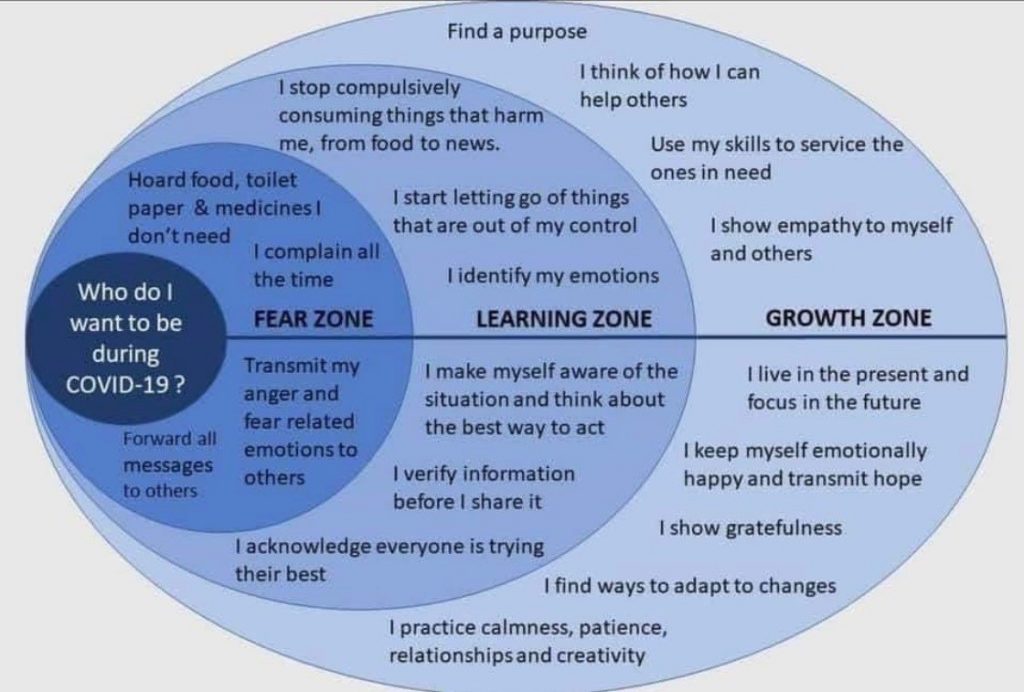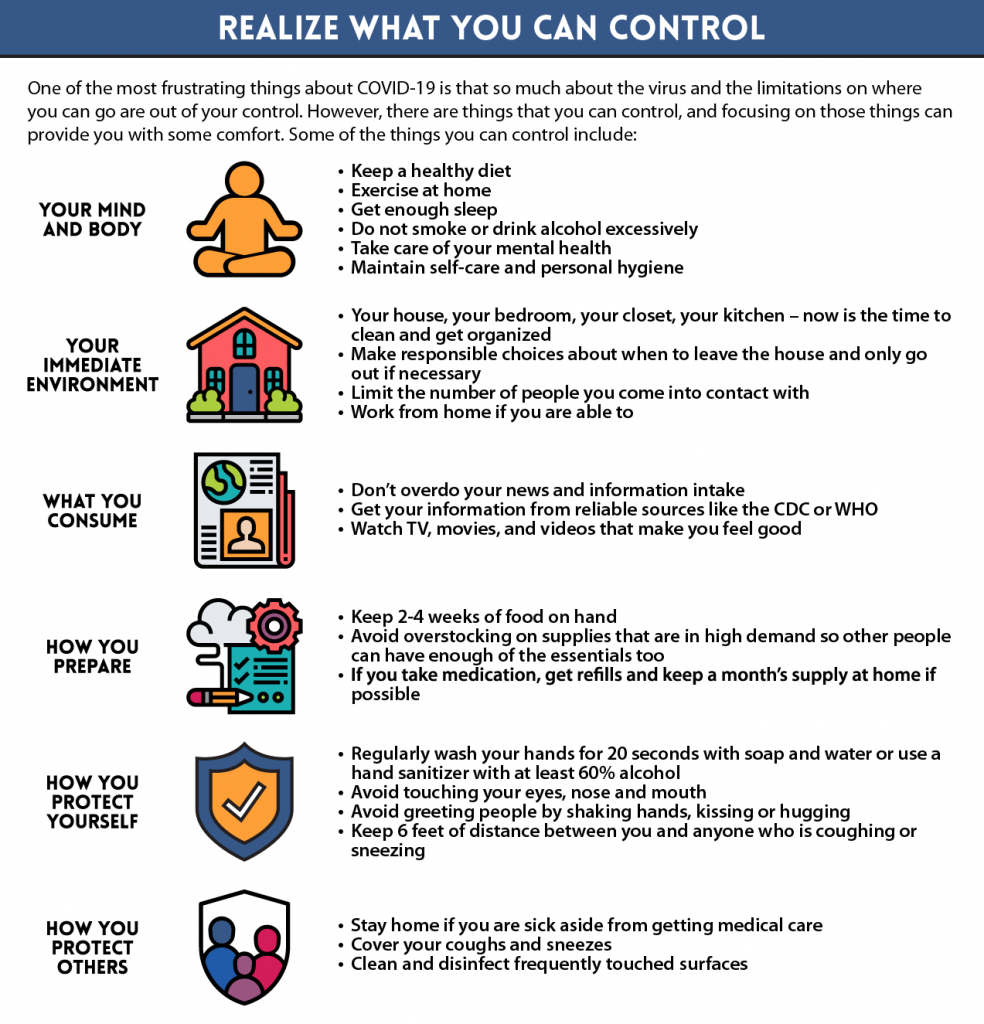
← Back to COVID-19 & Spinal Cord Injury
Due to the coronavirus we all have experience a collective trauma and many are experiencing worry, isolation, loneliness, and anxiety over the crisis. Stay-at-home orders and lockdowns are providing all sorts of new challenges for the Spinal Cord Injury and Disability community. As society grapples with how to carry on with everyday life, everyone is dealing with some sort of emotional or mental impact from our changing world. Research shows that people with spinal cord injury are at a higher risk of developing mental health disorders, and we know that mental health can also affect your physical health. It’s why is so important to prioritize our mental health! There are measures you can take to limit these feelings at this time. We compiled a list of resources for advice on how to best manage the feelings of stress and anxiety during the COVID-19 outbreak.
What do I want to be during COVID-19?

Realize What You Can Control

Prioritize Your Health
Mental health is closely tied to physical health, and taking care of your body is more important than ever right now. Taking care of your health with paralysis means getting enough sleep, drinking enough water, taking vitamins, eating healthy and plenty of exercise (view our guide for Inclusive Home Workouts). Seek medical attention if needed. Mount Sinai is conducting spinal cord injury care consultations through video telehealth visits, call 212-241-6321 for an appointment.
Combat Isolation
The isolation due to the stay at home orders is leading to extreme loneliness, and this is especially true for people with spinal cord injuries. To feel connected to family and friends during this time, make sure to use social media in a healthy way to connect.
Our Support Groups
Social support at this time is so important, our support groups are now virtual, join us!
- SCI Transitions Support Group: Moderated by Angela Riccobonno, PhD, Transitions Group provides counseling, support, and education to all members. Virtual Meetings are held every Wednesday at 12 PM. In order to maintain patient confidentiality, this group is open BY INVITATION ONLY. To request admission, please contact: Angela Riccobono, Ph.D. at angela.riccobono@mountsinai.org.
- Spinal Cord Injury Well-Being Group: This yoga and meditation virtual class are held every Monday at 12 PM. Each week a expert Yogi leads the class.To RSVP and receive the code for the Zoom session, please contact Woody Wood at Richard.wood1@mountsinsi.org. Archived videos of past yoga classes are coming soon!
- SCI Support Group: This group is for individuals with SCI to come together and share their experiences with each other so that we all can live a more fulfilling life with a spinal cord injury. Weekly support group are held Fridays at 12:00 PM To RSVP and receive the code for the Zoom session contact Jim Cesario at James.Cesario@mountsinai.org.
- Women on Wheels Support Group: Our WOW group provides women with SCI the space to share their personal and intimate concerns with other women across age ranges, injury types and levels, and years of experience. Held every 2nd and last Wednesday of every month at 3 PM. Please email christina.ganon@mountsinai.org to RSVP and receive the code for the Zoom session.
Visit our Virtual Support List Page for complete list of our groups and classes.
Factsheets
- List of COVID-19 Digital/ App Mental Health Resources
- Mental health and psychosocial considerations during the COVID-19 outbreak
- Reminders When Coping With Grief
- Coping with Grief during COVID-19: Ten Tips for Helping Others Grieve
- Guide: Managing Anxiety in an Anxiety-Provoking Situation (Version Español)
Hotlines
- NYC Well: Free 24/7 Confidential Mental Health Counseling, you can call, text or chat online. Phone: 888-692-9355 / (888-NYC-WELL) Text “Well” to 65173 or chat online.
- Crisis Text Line: Text “Got5” to 741-741 Frontline worker? Text “FRONTLINENY” to 741-741 for specialized support
- The National Alliance on Mental Illness (NAMI): NAMI operates an emergency mental health hotline Monday–Friday from 10 a.m. to 6 p.m. EST. Operators can provide information about mental illness and refer callers to treatment, support groups, family support, and legal support, if needed call 1-800-950-6264.
- SAMHSA Treatment Referral Helpline: Get general information on mental health and locate treatment services in your area. Speak to a live person, Monday through Friday from 8 a.m. to 8 p.m. EST. 1-877-SAMHSA7 (1-877-726-4727)
- Mental Health America Hotline: Text MHA to 741741. Mental Health America is a nationwide organization that provides assistance through this text line. You will be linked to someone who can guide you through a crisis or just provide information.
- National Institute of Mental Health (NIMH): This organization has a variety of methods for you to communicate with knowledgeable people about mental health issues. In addition to the phone line, there is a live online chat option. These resources are available Monday–Friday, 8:30 a.m. to 5 p.m. EST. (866) 615-6464.
- Caregiver Help Desk: Contact Caregiver Action Network’s Care Support Team by dialing 855-227-3640. Staffed by caregiving experts, the Help Desk helps you find the right information you need to help you navigate your complex caregiving challenges. Caregiving experts are available 8:00 AM – 7:00 PM ET.
- New York State Emotional Support Helpline: The Emotional Support Helpline provides free and confidential support, helping callers experiencing increased anxiety due to the coronavirus emergency. The Helpline is staffed by volunteers, including mental health professionals, who have received training in crisis counseling. Voice Phone 1-844-863-9314
- Veterans Crisis Line: Text a message to 838255. Operated by the Department of Veterans Affairs, these services aid veterans and their families who may be in crisis by connecting them with VA responders. 1-800-273-8255.
More Resources
- Mental Health App Library: Apps and online tools to help you manage your health and emotional wellbeing.
- NY Mental Health Program Directory: NY Office of Mental Health directory for mental health programs across the state.
- National Mental Health Alliance: Mental Health COVID-19 Resource and Information Guide.
- How to Help Someone with Anxiety or Depression During COVID-19: Mental Health First Aid guide.
- 4 Self-Care Tips for How to Deal with Anxiety: Mental Health First Aid guide.
- Demystifying Psychotherapy: Alex Alverson, Ph.D., clinical neuropsychologist at Shepherd Center, provides an overview of psychotherapy for Mental Health Awareness Month.
- Do’s & Don’ts for Good Sleep: Wendy Magnoli, Ph.D., licensed psychologist, provides advice for getting restful sleep during Mental Health Awareness Month.
- Mental Health Screening: Mental Health of America also offer an online mental health screening. It’s a quick, free, and private way for people to assess their mental health and recognize signs of mental health problems.
- U.S Department of Veterans Affairs -Mental Health: The U.S. Department of Veterans Affairs website hosts screening tools, a veterans crisis line and a guide to mental health conditions that often plague veterans.
- Depression and SCI: Spinal Cord Injury Model Systems factsheet on causes and treatments for depression after spinal cord injuries.
- Reeve Foundation Peer & Family Support Program: A national peer-to-peer mentoring program providing emotional support as well as local and national information and resources to people living with paralysis, and their families and caregivers.
- The Benefits of Meditation for Individuals with a Spinal Cord or Brain Injury: Craig Hospital guide on Meditation for SCI
- Addiction During COVID-19: Rehab Spot web guide sharing information on drugs, alcohol, addiction, and recovery during COVID-19 Pandemic.
- Resources for Substance Abuse Treatment During Coronavirus (COVID-19): The Recovery Village® has resources to help anyone struggling with substance use, increased anxiety and depression or other mental health disorders cope with the unprecedented challenges that have emerged from the COVID-19 virus (also known as novel coronavirus).
Disclaimer:
Linking to publications, materials or websites of other organizations or entities does not constitute endorsement by Mount Sinai of such publications, materials or websites. Mount Sinai provides these references and links because they may be of value to persons interested in SCI.
